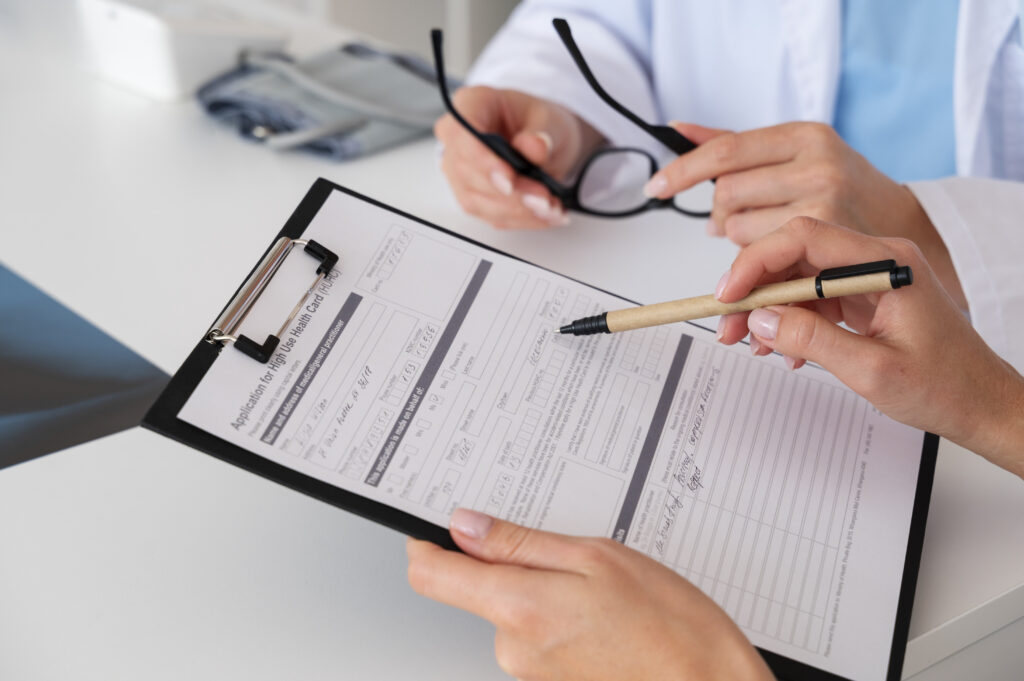- Phone 407-586-5677
- Email: [email protected]
- Fax : 407-956-2425
Preparing for surgery can feel overwhelming. But one of the most important steps is the preop checkup, also called a pre-operative physical. This exam helps ensure your body is ready for the procedure. It’s also how your doctor identifies potential risks and makes sure everything goes smoothly.
In this blog, we’ll break down what pre-operative physicals are, why they matter, who needs them, and what you should expect. We’ll also answer common questions about the process.

A pre-operative physical is a medical checkup done before you undergo surgery. It’s part of preoperative care that ensures your body is in good condition to handle the stress of surgery and anaesthesia. It also helps detect any underlying issues that might affect your recovery.
The exam usually includes:
This checkup is a critical step toward safer surgery and better outcomes.
A preop exam serves many purposes. It’s not just a formality. It gives the surgical team the green light to move forward. If problems are found, surgery might be delayed or adjusted for safety.
Some reasons it’s important:
Think of it as your body’s readiness test.
Not everyone needs a full preop clearance, but many do—especially those undergoing major procedures or those with existing medical conditions.
You may need a pre op appointment if:
Even for minor procedures, some level of preoperative review may be necessary.

It’s best to book your pre op appointment a few weeks before your surgery. This allows enough time for any additional testing or treatment if needed.
Generally, the physical is done within 30 days of surgery. But follow your surgeon’s specific instructions. Timing can vary depending on the procedure and your health status.
Your pre op physical will usually be done by your primary care doctor or a hospital physician. It may take around 30 to 60 minutes.
Here’s what to expect:
You may also get advice on:
Medical clearance for surgery is an official statement from your doctor verifying that you’re in suitable health to undergo the procedure safely. It’s based on the results of your preoperative evaluation.
This clearance helps your surgeon plan your procedure more safely. It also signals that risks have been reviewed and managed. In some cases, you may need to see a specialist, like a cardiologist, for final approval.
Certain health conditions make preoperative clearance more important. These include:
Your doctor will take extra precautions if any of these apply.

Based on your health, your doctor may order tests such as:
These helps complete the preoperative profile of your health.
Here are simple ways to make your preop visit smooth and stress-free:
Being well-prepared allows your healthcare team to design the most secure and effective plan for your surgery.
Good preoperative care helps reduce the chances of infections, bleeding, or other complications. It also speeds up healing by making sure your body is in top shape before going under the knife.
Plus, being informed and prepared reduces anxiety. Knowing what to expect makes the journey easier from start to finish.
If your doctor finds issues during the preop clearance, your surgery might be postponed. This allows time to treat the problem, whether it’s high blood pressure, an infection, or something else.
In rare cases, surgery may be cancelled if the risk is too high. But often, a delay is enough to correct the problem and reschedule the procedure safely.
The Role of Specialists in Preoperative Clearance
In some cases, your primary care doctor may refer you to a specialist. This often happens if you have heart, lung, or kidney problems.
These specialists offer deeper insights into your condition. Their input helps the team decide if any special steps are needed before or during surgery.

A pre-op exam is usually valid for 30 days. Some hospitals accept them up to 60 days in advance, especially for healthy patients.
If your surgery is delayed beyond that, you might need to repeat the exam or some tests.
A preop exam is a checkup done before surgery to ensure you are healthy enough to undergo the procedure safely.
Not always. Minor procedures may not need full clearance. But most major surgeries do require it, especially for older adults or those with chronic health issues.
Usually, your primary care physician provides the clearance. Sometimes, a specialist’s input is needed too.
Bring your ID, insurance, list of medications, past medical records, and a list of questions or concerns.
Yes. If serious risks are found, the surgery might be delayed or cancelled until the issue is treated.
A pre-operative physical is more than just a box to check. It’s a crucial part of your preoperative journey. It protects your health, prevents problems, and helps your care team tailor the best surgical plan for you.
If you have surgery coming up, don’t skip this step. Schedule your pre op appointment, follow your doctor’s advice, and ask questions. That’s the best way to walk into surgery confident and prepared.